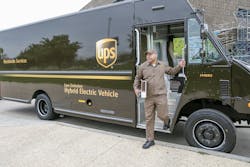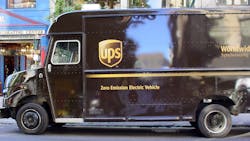Green Fleet of the Year 2018: Bravo Big Brown!
United Parcel Service (UPS) dubs its fleet of 9,000 or so alternatively powered vehicles a “rolling laboratory”—and for good reason. In the words of Carlton Rose, president of global fleet maintenance and engineering at UPS, making investments in not one alternative form of vehicle propulsion, but several simultaneously, allows the parcel delivery company to “define excellence” in that space.
“If you are the one who defines excellence, you are the one who develops the expertise to get there,” he explained during the keynote speech at the annual Technology & Maintenance Council (TMC) conference in Atlanta earlier this year. “For example, in 2016 we bought 125 hybrid-electric Workhorse vans. In 2017, we bought 200 more. Why? Because they now get 400% better fuel economy than gasoline-only vans. Previously, we could only could get 10 to 15% better fuel economy with hybrids.”
Those Class 5 delivery trucks offer an approximate range of 100 miles between charges, which UPS said is “ideal” for delivery routes in and around cities. And they’ll be built using a cab-forward design, which optimizes the driver compartment and cargo area, increasing efficiency and reducing vehicle weight, the company noted.
UPS plans to test those vehicles primarily on urban routes in several U.S. cities, including Atlanta, Dallas and Los Angeles.
Following real-world test deployments, UPS and Workhorse will fine-tune the design in time to deploy a larger fleet in 2019 and beyond. Since most of the maintenance costs of a vehicle are associated with the engine and related components, Rose noted, UPS expects the operating cost of the new plug-in electric vehicle to be less than a similarly equipped diesel or gasoline vehicle. The eventual goal of UPS is to make such all-electric vans the “standard selection,” where appropriate, and potentially replacing some 35,000 diesel or gasoline trucks in its fleet that are comparable in size to those all-electric vans.
“It is understandable to be afraid of the unknown. It is in fact smart. But fear can also discourage investment,” Rose stressed in regard to trying out new technology, especially when it comes to alternative fuels. “Don’t sacrifice the good for the perfect.”
UPS has more than 300 electric vehicles deployed in Europe and the U.S., along with nearly 700 hybrid electric vehicles, and it has also placed an order for 125 of the new all-electric Semi Class 8 tractors to be built by Tesla in 2019. And last September, UPS took the lead in becoming the first commercial customer in the U.S. to start using three eCanter medium-duty, all-electric trucks built by Daimler Trucks North America’s Fuso subsidiary.
UPS’s goal is to make one in four new vehicles purchased by 2020 an alternative fuel or advanced technology vehicle. The company has also pledged to obtain 25% of the electricity it consumes from renewable energy sources by 2025 and replace 40% of all “ground fuel” with sources other than conventional gasoline and diesel, an increase from 19.6% in 2016.
“You cannot be a linear thinker in an exponential world, for today’s excellence can become tomorrow’s mediocrity quickly,” Rose emphasized to explain why UPS is making such a big—and expensive—push into alternative propulsion. For example, he noted that UPS invested $90 million in natural gas vehicles and infrastructure alone last year. This investment included an additional six compressed natural gas (CNG) fueling stations, 390 new CNG tractors and terminal trucks, and 250 liquefied natural gas (LNG) vehicles. And the company plans to keep pursuing that technology despite criticism from some quarters that it is still a carbon pollutant.
“From our perspective, ‘less bad’ is actually ‘very good’—it gives us more technical knowledge,” he said. “We like to think of ourselves as a technology company with trucks. It’s no small feat moving from diesel and gasoline to electricity and natural gas. There is no ‘silver bullet’ in this area.”
Since 2009 alone, UPS said it has invested more than $750 million in alternative fuel and advanced technology vehicles and fueling stations globally.
To make such investments pay off over the long term, Rose said UPS uses what he called the “A-B-C” approach: “adaptability-bravery-commitment.”
“Adaptability is about the willingness to change as technology changes because learning helps the unfamiliar become familiar,” he said.
Bravery is about overcoming the fear of change and what it might bring, Rose noted. “Back in 1954, UPS faced its greatest period of change—envisioning a world where we would deliver packages to customers in many parts of the country within two days. That required a lot of brave thinking, but look at where we are today,” he emphasized.
Finally, there is “commitment,” which Rose said is recognition of the need to gain expertise and the focus to obtain it. That “commitment” is why UPS continues to move in multiple directions regarding alternative fuels.
For example, last November UPS forged a seven-year agreement with Big Ox Energy, a wholly owned subsidiary of Environmental Energy Capital, to purchase 10 million gallon equivalents of renewable natural gas (RNG) per year, a substance also known as biomethane. That’s in addition to a five-year deal made earlier in 2017 with AMP Energy for 1.5 million gallon equivalents of RNG per year from the Fair Oaks Farms in Indiana. UPS said these RNG agreements will help it reach its 40% “alternative fleet fuel” goal by 2025.
“Natural gas is a proven alternative fuel to gasoline and diesel and is a key building block for our goal to reduce greenhouse gas emissions in our ground fleet,” Mike Casteel, director of fleet procurement at UPS, said. “These agreements add significantly to our investment in the use of RNG and will help put us on track to nearly triple our annual use of RNG. They are also a direct reflection of our ongoing commitment to help shape the renewable natural gas industry.”
Seven UPS fueling stations in Kentucky, Georgia, Pennsylvania, and Virginia, among other states, will use the Big Ox RNG to fuel delivery vehicles and tractors. The company noted that RNG can be derived from sources that include decomposing organic waste in landfills, wastewater treatment, and agriculture. It is then distributed through the natural gas pipeline system, making it available for use as CNG or LNG.
UPS added that it used 61 million gallons of natural gas in its ground fleet in 2016, which included 4.6 million gallons of RNG, increasing its RNG consumption to 14 million gallons of RNG by the end of 2017.
“All of those efforts are a critical part of our strategy for the future,” Rose noted.
About the Author
Fleet Owner Staff
Our Editorial Team
Kevin Jones, Editorial Director, Commercial Vehicle Group
Cristina Commendatore, Executive Editor
Scott Achelpohl, Managing Editor
Josh Fisher, Senior Editor
Catharine Conway, Digital Editor
Eric Van Egeren, Art Director

